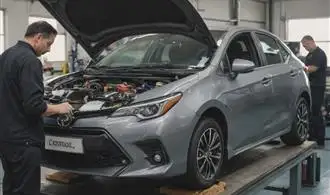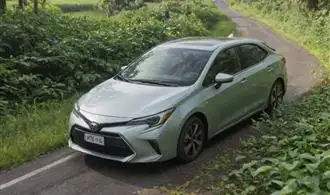
Pricing Comparison Toyota Corolla vs Volkswagen Jetta
When it comes to purchasing a compact sedan, the Toyota Corolla and Volkswagen Jetta are two popular options. While the Jetta may boast a slightly more premium feel, the Corolla offers a compelling value proposition that is worth considering. Let's dive into the pricing comparison between these two vehicles.
The base model Toyota Corolla starts at around $20,000, making it one of the most affordable options in the compact sedan segment. The Jetta, on the other hand, typically has a starting price that is $2,000 to $3,000 higher, with base models often ranging from $22,000 to $23,000. This price difference can be a significant factor for buyers on a tight budget or those looking to maximize their dollar.
When it comes to feature content, the Corolla and Jetta are relatively comparable at their respective price points. Both offer standard features like:
- Touchscreen infotainment system
- Automatic climate control
- Rearview camera
- Bluetooth connectivity
Fuel efficiency is another area where the Corolla shines. With a fuel economy rating of up to 31 mpg in the city and 40 mpg on the highway, the Corolla outperforms the Jetta, which typically achieves around 29 mpg in the city and 37 mpg on the highway. This difference in fuel efficiency can translate to significant savings on fuel costs over the life of the vehicle, particularly for those who do a lot of driving.
It's worth noting that both the Corolla and Jetta have a strong reputation for reliability and long-term ownership satisfaction. However, the Corolla has a slight edge in this regard, with a proven track record of dependability and lower maintenance costs over time.
Fuel Efficiency Toyota Corolla vs Volkswagen Jetta
When it comes to fuel efficiency, the Toyota Corolla and Volkswagen Jetta are direct competitors in the compact sedan market. While both vehicles offer impressive mileage, there are some key differences that potential buyers should be aware of.
The Toyota Corolla is renowned for its exceptional fuel economy, with the base model earning an EPA-estimated 31 mpg in the city and 40 mpg on the highway. This efficiency is largely due to the Corolla's lightweight design, aerodynamic body, and advanced engine technology. Toyota has consistently prioritized fuel efficiency in the Corolla's development, making it a standout choice for those seeking a cost-effective and environmentally conscious driving experience.
In contrast, the Volkswagen Jetta boasts a slightly lower EPA-estimated fuel economy, with the base model achieving 29 mpg in the city and 39 mpg on the highway. While the Jetta is still a fuel-efficient option, the Corolla's numbers give it a slight edge, especially for drivers who prioritize maximizing their fuel savings.
It's worth noting that fuel efficiency can be influenced by various factors, such as driving habits, road conditions, and the vehicle's optional features. Nonetheless, the Corolla's consistent performance in this area makes it a compelling choice for those seeking a practical and economical daily driver.
Beyond fuel efficiency, the Toyota Corolla also distinguishes itself with its reliability, longevity, and overall cost of ownership. The Corolla is known for its robust engineering and reputation for dependability, which can translate to lower maintenance and repair costs over the long term.
Reliability and Maintenance Costs Toyota Corolla vs Volkswagen Jetta
When it comes to compact sedans, the Toyota Corolla and Volkswagen Jetta are two of the most popular options on the market. While both vehicles offer their own unique features and benefits, the Corolla is often considered the more reliable and cost-effective choice, especially when it comes to maintenance and ownership costs.
The Toyota Corolla has a well-earned reputation for reliability, with a long history of durable and dependable performance. The vehicle's simple and straightforward design, combined with Toyota's commitment to quality, ensures that the Corolla can withstand the rigors of daily driving with minimal issues. This translates to fewer trips to the mechanic and lower overall maintenance costs over the life of the vehicle.
In contrast, the Volkswagen Jetta, while a capable and well-designed car, has a reputation for being more complex and potentially more expensive to maintain. Volkswagen vehicles often require specialized tools and expertise, which can drive up the cost of routine service and repairs. Additionally, the Jetta's turbocharged engine and more advanced features can lead to higher maintenance requirements, especially as the vehicle ages.
When it comes to specific maintenance costs, the Toyota Corolla consistently outperforms the Volkswagen Jetta. According to industry data, the average annual maintenance cost for a Corolla is around $429, while the average annual maintenance cost for a Jetta is around $679. This difference of $250 per year can add up significantly over the lifetime of the vehicle, making the Corolla the more cost-effective choice for those looking to minimize their long-term ownership expenses.
Furthermore, the Toyota Corolla is renowned for its exceptional reliability, with many models routinely surpassing the 200,000-mile mark with proper maintenance. This longevity translates to a higher resale value, as the Corolla is seen as a more dependable and long-lasting investment compared to the Jetta.
Safety Features Toyota Corolla vs Volkswagen Jetta
When it comes to safety, the Toyota Corolla and Volkswagen Jetta are both impressive contenders. Both vehicles offer a range of advanced safety features designed to protect drivers and passengers. However, there are some key differences that may sway your decision when choosing between the two.
The Toyota Corolla boasts a comprehensive suite of safety technologies, including the Toyota Safety Sense system. This package includes features like pre-collision warning with pedestrian detection, lane departure alert, and dynamic radar cruise control. These cutting-edge systems use a combination of sensors and cameras to monitor the vehicle's surroundings and provide timely warnings or interventions to help prevent accidents.
In contrast, the Volkswagen Jetta also offers a robust set of safety features, including forward collision warning, autonomous emergency braking, and a rearview camera. However, some of these features may only be available as optional upgrades, whereas they come standard on the Corolla.
One area where the Corolla shines is its stellar crash test ratings. The vehicle has consistently earned top scores from the Insurance Institute for Highway Safety (IIHS) and the National Highway Traffic Safety Administration (NHTSA), indicating its exceptional performance in protecting occupants in the event of a collision. The Jetta also performs well in safety tests, but the Corolla may have a slight edge in this regard.
Another important factor to consider is the availability of advanced driver assistance technologies. The Corolla offers features like lane tracing assist, which helps keep the vehicle centered in its lane, and road sign assist, which recognizes and displays traffic signs on the dashboard. These features can greatly enhance the driving experience and improve overall safety.
Driving Dynamics Toyota Corolla vs Volkswagen Jetta
When considering the driving dynamics of the Toyota Corolla and Volkswagen Jetta, it's crucial to understand the unique characteristics of each vehicle. The Corolla is known for its smooth, comfortable ride, making it an excellent choice for everyday commuting and long-distance travel. The suspension is tuned to provide a balanced, well-planted feel on the road, delivering a sense of confidence and control even in less-than-ideal driving conditions.
In contrast, the Volkswagen Jetta is often praised for its sportier, more responsive handling. The Jetta's suspension is more tightly tuned, providing a more dynamic driving experience with a greater connection to the road. This makes the Jetta feel more agile and nimble, particularly when navigating winding roads or entering tight turns.
When it comes to engine performance, the Corolla and Jetta offer different strengths. The Corolla's standard engine is known for its efficiency and reliability, delivering a smooth and linear power delivery that is well-suited for everyday driving. The Jetta, on the other hand, often comes with more powerful engine options, providing a bit more punch and acceleration when needed.
It's worth noting that the driving dynamics of both vehicles can also be influenced by the specific trim level and options chosen. Higher-end Corolla models may offer upgrades like sport-tuned suspensions or larger wheels, which can enhance the driving experience. Similarly, Jetta models with the available turbocharged engines or performance-oriented packages can provide an even more engaging driving dynamic.
















